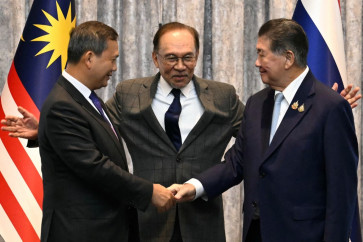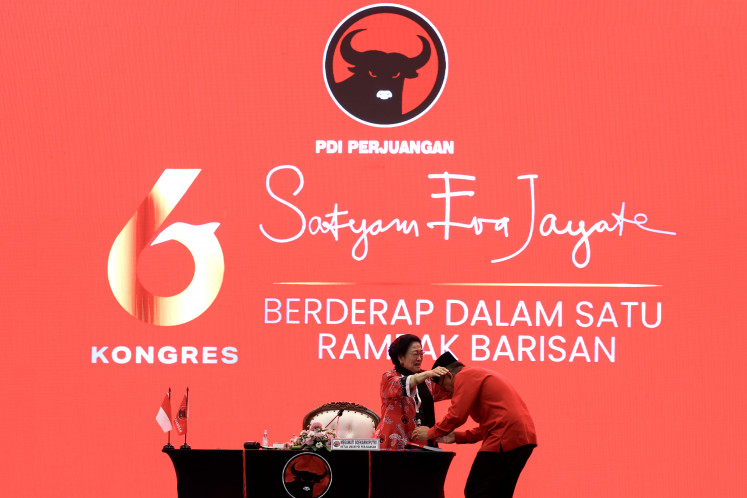Popular Reads
Top Results
Can't find what you're looking for?
View all search resultsPopular Reads
Top Results
Can't find what you're looking for?
View all search resultsIndonesian at its 89: Beyond language preservation
Diplomasi Tabloid (June-July 2017), a newsletter published by the Foreign Ministry, has recently released some starling news: the Indonesian language is being taught in several parts of the world
Change text size
Gift Premium Articles
to Anyone
D
iplomasi Tabloid (June-July 2017), a newsletter published by the Foreign Ministry, has recently released some starling news: the Indonesian language is being taught in several parts of the world. It reported that 52 foreign countries had opened Indonesian Language Studies through the so-called The Teaching of Indonesian for Foreign Speakers (BIPA) program, facilitated by the Indonesian embassies in those countries.
Moreover, nine universities in Japan, Australia, Ukraine, South Korea, Vietnam, Morocco, the United States, Canada and Suriname are reportedly offering students Indonesian language courses.
The enthusiasm for learning the language overseas emanates from people’s interests in knowing more about the social, cultural, ecological, economic and political system of Indonesia. This fact, however, stands in direct contrast to the situation in the country, where the passion for learning Indonesian is at its lowest, and the zeal for learning foreign languages, including English, are peaking.
This is understandable. Transnational relations, like it or not, have compelled people of different nationalities and linguistic background to use English, thus strengthening and further legitimating the language as the most important medium of communication among nations, hence its role as the world’s lingua franca.
With the prevalent use of English among Indonesians, the fervor to learn Indonesian among foreign citizens is seen by many as a golden opportunity to internationalize and preserve the language along with the country’s cultural identity.
It is noteworthy to stress here that the call for language preservation and cultural maintenance has had a long, convoluted history. Suffice it to say, to counter the incessant influx of foreign terminologies, the Indonesian purists at that time felt obliged to ardently promote the use of Indonesian and its indigenous languages in life domains such as education, politics, the economy, entertainment and business.
The alteration of English-bearing names in these domains into Indonesian and its local languages was clear evidence of the language preservation endeavor initiated by local purists under the auspices of the then-Language Center.
____________________________
The flood of foreign words is inevitable and unabated until now.
Yet, the flood of foreign words is inevitable and unabated until now. The urge to acquire English through either formal education or daily engagements in virtual world intensifies due to the advancement of information technology and the pressure to compete in the transnational context.
In this context, language preservation should go beyond issues of language promotion through teaching (both at home and overseas) and exhortations to use and to communicate in Indonesian, the unifying language. It extends to issues more contextual, ethical and relevant to the current conditions.
What we need now is a more proactive approach to language preservation, not a reactive one.
This suggests that the call to speak Indonesian and its myriad indigenous languages, amid the prevalent use of English among Indonesian speakers, should not be gauged simply as a linguistic and cultural maintenance, but as an act of counter-linguistic hegemony to the latter.
We need to be aware that the notion of language is by no means a neutral medium of communication, and that language teaching is by no means an innocent activity. It is an ideologically-loaded construct and its teaching carries with it this ideology.
The proactive approach to language preservation in the form of the counter-hegemony act can be carried through high-stake and low-stake literacy activities, and surely other activities that have a direct impact on people’s linguistic practices.
As English has now been used as a language of wider communication and permeated into local people’s life domains, language preservation, using the proactive approach, stands as the plausible option to resist linguistic, cultural and ideological hegemony.
The approach aims at “de-purifying” English by infusing local ideologies and cultural identities into the language (both spoken and written) via either everyday linguistic practices or formal language education.
This is indeed linguistic activism that encourages the translingual practices whereby spoken and written texts from two or more languages (in this case Indonesian and English) are deliberately mixed and meshed to achieve particular communicative purposes, resulting in a hybrid textual realization.
It seems clear that efforts to promote Indonesian through pedagogic activities in the international forum and mundane linguistic exhortations at home escape the idea of language politicization. These well-intentioned apolitical labors treat language as the static markers of an identity out of sync with ideological constructs that can serve national interests.
On the face of it, taking a radical and political view of the counter-hegemonic approach in the present context of English language domination — which may trigger linguistic subjugation — not only complements, but also enriches our traditional understanding of language preservation.
____________________________
The writer teaches at the graduate school of Applied English Linguistics, School of Education, Atma Jaya Catholic University, Jakarta.










